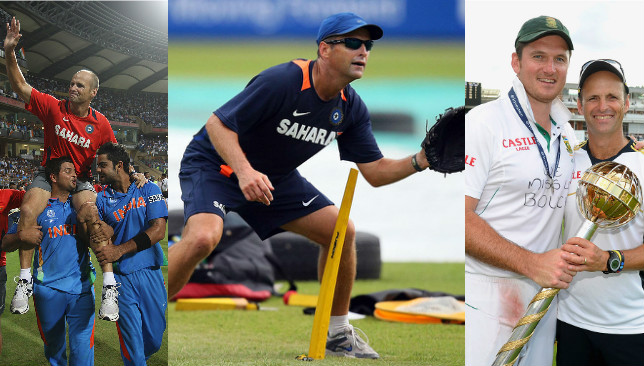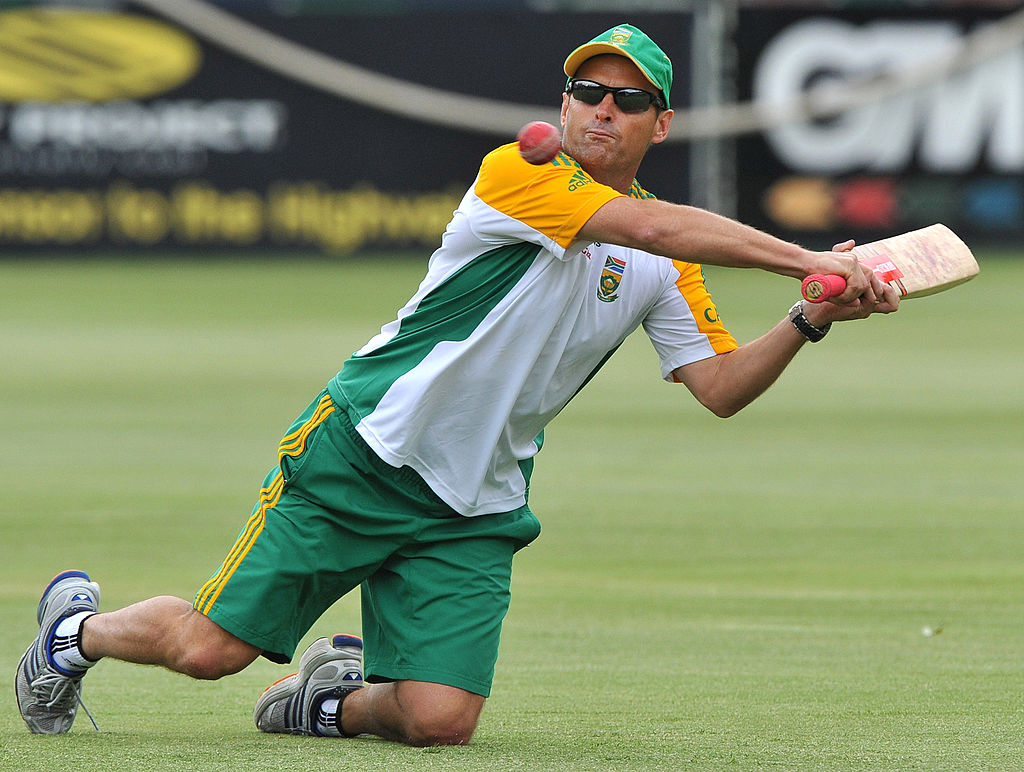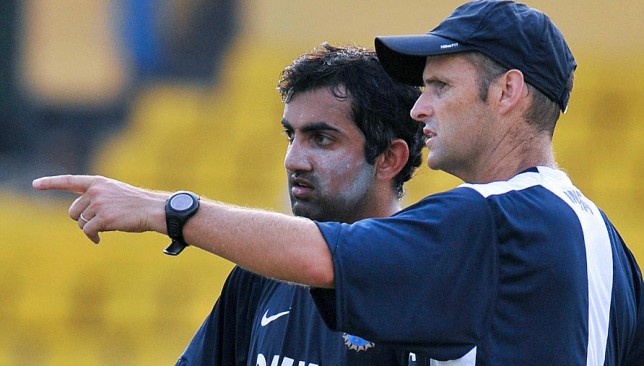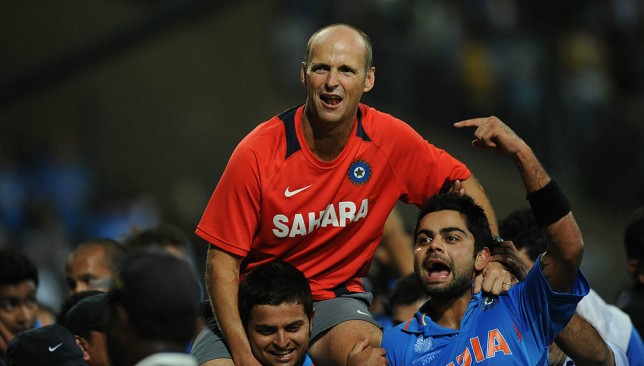
Focused is perhaps the perfect adjective to describe former South African opener and World Cup winning coach, Gary Kirsten. It’s almost as if he knows exactly what he is doing and is fully aware of what he wants to achieve, everytime.
It’s this focus, along with immense amounts of discipline and a steely temperament that made him irreplaceable at the top of the order while playing for South Africa. While his eleven year long international career came to an end in 2004 after 101 Tests and 185 ODIs, he didn’t cease to be irreplaceable.
In his first coaching assignment with India, he took the team to such great heights that the country’s most successful captain called him “the best thing to happen to Indian cricket”. So much so that stalwarts like VVS Laxman tried to cajole Kirsten to stay on for another year or so. As a player or as a coach, teams seldom know what to do without Kirsten.
Unlike many of his contemporaries who are happy with lucrative coaching or commentary assignments, the 48-year old is traveling the world and taking cricket to countries and areas that are yet to embrace the sport, helping youngsters as young as school students understand the game better.
Amid his hectic schedule, Kirsten spoke exclusively to Sport360.com in an interview where he talks about his work as a coach and the future of the game he loves.
You’ve been doing some good work around the world through your cricket academies, could you tell us a bit about that?
We are very excited by the work we are doing, and it’s not just limited to the local academy. Whilst we do a lot of work in the Cape Town region, we invite players from around the world to come to Cape Town, it’s a great destination and we’ve had quite a few players from the English county circuit coming and preparing with us. We’ve also had players from India come and have the Cape Town experience, along with one or two players from the UAE as well.
It’s good to expose the academy to international cricketers. We also do a lot of work in various places around the world – we’ve been in the UAE and UK on a number of occasions, and we are about to go to the Netherlands. A lot of work is being done in the associate countries.
#UAE duo to reap rewards after intense week at @GK_CA in Cape Town https://t.co/imz68YioRb pic.twitter.com/ZY2je76Dtl
— Sport360° (@Sport360) May 12, 2016
Two young kids from UAE – Riyaan and Utkarsh – have also trained under your guidance, how did that turn out?
They enjoyed the experience. Just for them to have an understanding of what cricket is like in a different part of the world. Obviously we had to work a little bit on their skills to improve them. We had a chance to work with them earlier also, in our previous visits to the UAE – so they were familiar with our work. They just wanted to come over and experience how it is like to train in South Africa. It was great to have them on board.
How important is it for UAE cricket to have experienced people like you engage with school-going cricketers?
It’s important in any cricket system to know how strong the school and grassroots structures are. I think it’s exciting times for UAE cricket because I think there’s a lot of interest in the game and if you can create good systems through cricket programs running in the schools and subsequently run your cricket league then I think there’s no reason why you cannot produce good talent.
That’s a particular area of focus for us in Dubai. In fact, we are going back there next month to take up another assignment and we’d love to do as much work as we can at school level. It doesn’t matter where you go in the world, if you have kids at school playing cricket in leagues, it’s a step in the right direction.
Modern cricket puts a lot of emphasis on being aggressive and flamboyant, especially in a bid to make it to the T20 leagues. Do you think at times there’s a conflict where youngsters don’t focus on the foundations but search for big ticket fame?

It’s a bit of a double-edged sword unfortunately. As coaches we want to teach the fundamentals of the game so that your game can stand the test of time in all formats. It’s like saying to a golfer that you want to become a scratch golfer, but you need to know how to hit a seven iron very consistently.
Batting or bowling is no different. Have you got strong fundamentals in your game or are you just good for one format which is T20 cricket? We find that a lot of youngsters that we are working with come with a good set of T20 skills but lack good fundamentals in their game. So it’s for us to help them grow in that space.
T20 leagues are critical for the survival of the game aren’t they…
I think it’s a challenge. The game in my opinion is really going to survive financially on the back of strong domestic T20 competitions – and I think every country realises that for cricket to survive in their region, there has to be a T20 product that can sustain the game in that region.
As a fact I know there are countries around the world that are trying to emulate the IPLs and BBLs. Financial sustenance is going to become relevant for all cricket playing countries around the world. Unfortunately, four-day cricket is not a financially viable product.
The extensive coaching work that you are doing at the grassroots level is extremely important for the game’s development. Should this be a cue for other former cricketers to also do the same?
Everyone makes their decision about what they want to do once they have retired from playing. I always wanted to go into coaching because I loved the educational aspect of it – you are in the teaching business.
For me it’s fun to watch a young player develop and become a good player – I enjoy that space and I think there’s a need for quality coaching and expertise especially in regions that don’t have the resources for that. Any intervention in such places can go a long way in helping the coaches and players there to understand what’s best for the development of local talent.
[interaction id=”573a3149fc69012768a75137″]
Do you think one needs to be a good player in order to be a good coach?
Absolutely not. I have seen many, many coaches who’ve not been top-class players but have been great coaches. It depends on what level you are working at. You build your credibility as a coach with your work ethic, the calm and effort you are going to put in and also through your knowledge base.
On the flip side, I have seen examples of high-profile players who’ve been very poor coaches.
Throughout your coaching career, you’ve always been identified as a players’ coach, how important is that in the current scenario?
In modern world it’s all about the management. You have to go into the corporate space to understand management at the highest levels in any industry. When you talk about working with 20-year olds – the 20-year-olds of the mid-2000s are very different from the 20 year olds of the 1980s and 90s. They have a greater access to information, they’ve got stronger opinions about things and are willing to take more risks to make a living.
So we need to manage and coach differently. With the new era of knowledge we have in the world today, it would be foolish as a leader of young people to think that you have the key to success. Some young people have great thinking and ideas, and if you can collaborate them into a greater decision making process, and encourage them to contribute – then you are making good management decisions.
Industry leaders are successful because they create collaborative environments and environments where thought resources are pooled, and the individuals move forward as a unit.
In coaching style, do you think there’s also a shift where strategy is nowadays placed on a pedestal, even above technique?
All formats vary. T20 cricket is very much a strategic game where use of data and application of a different set of skills is very important. The ability to strategically map out a season or a game through planning against oppositions and rotation of players has become a pivotal component of T20 cricket.
But the other extreme is Test cricket, a format that requires longer term strategies over an entire Test series. Each of them have their nuances and require different coaching skills.
For me coaching a domestic T20 team is very exciting. You have to deal with a lot of challenges, managing a squad of over 20 players being one of them. I think the format is in line with a lot of mainstream domestic professional sports – like professional soccer. All these sports have moved towards becoming strong domestic products and the use of data and science is becoming relevant.
You’ve coached top-ranked Test teams and also had a stint with a T20 side, did the transition come easy or did you have to adapt?
You have got keep adapting your coaching methodologies, you’ve got to stay relevant as a coach. In the two years with the Delhi Daredevils, we didn’t do that well as a team but it was a great learning curve for me in terms of how to stay relevant in a dynamic environment. World cricket is changing dramatically every year virtually at the moment.
[interaction id=”573a34c6eac5f7343b7518e1″]
One of your biggest contributions as Daredevils coach was the grooming of youngsters, is that something you are proud of?
It’s great to be able to work with young players and know that you can make a contribution to their careers. The team that we tried to put together at Delhi, it’s great to see someone like a Quinton de Kock doing really well. I think from a coaching perspective there’s nothing more exciting than that.
In a purist’s view, the best form of coaching is when you coach out of the result. When you take a young player and work on his technique, and he just comes to you and asks for a one-on-one session and that’s what I continue to do. Sometimes when you are coaching in the context of your team, and it is all about the result, it can be a tough space.
Gautam Gambhir spoke in a recent interview of the influence you’ve had on his career. How was your relationship with him?
It’s nice to know that I have been able to make a significant difference to a player’s career. I remember spending a lot of time with Gautam on his game. We became very good friends, because I saw in him a very similar cricketer to what I was and I valued his contributions immensely.
In fact, you reflect back in 2008 or 2009 where he was at one point the number one ranked Test batsman in the world. He had some incredible success over that period of time and I think we had just a very good relationship because I understood his game very well.
You referred to him as the ‘banker’, right?
Yeah, he was the rock for the Indian team. He was the first name on the team sheet, I wanted him in that side every time.

In a recent interview, Gautam Gambhir spoke of Kirsten’s influence on his game
MS Dhoni too, had a successful partnership with you. But once you left, India’s Test performances dropped and almost everyone criticised the skipper for that. Do you think that’s a little unfair to India’s most successful captain?
It is unfair. Something similar happened when I was with South Africa as well. We had a great Test run and then the Test team is battling now. Every team goes through that.
You think of the players that retired after that Test team had done so well – there were six or seven critical players who retired. A team is going to go through a new phase. Indian cricket went through that, and also had some very tough tours away from home.
Teams can’t sustain performances over a long period of time unless you have a group of young players that are really performing well and can hold their position consistently.
You’ve seen Dhoni’s successor, Virat Kohli grow under your watch. What are your observations about him?
He’s a fantastic human being. What I like about Virat is his unconditional self belief. It’s incredible to see the kind of belief he has in his own ability.
He wants to do well in the game, he’s got a strong desire and determination and some great presence. Players will want to play for him and there’s no reason why he cannot be a really positive leader for India, going forward.

‘Virat Kohli has exceptional self belief’
Was the 2011 World Cup win as coach extra special because you came really close to winning one as a player in 1999?
No, I am a very pragmatic person and I move on with things. I don’t reflect too much on results. I enjoyed the journey more – the World Cup was a culmination of a fantastic three years, I very quickly moved on and looked forward to the next challenge.
Final question, in spite of doing some great things as a coach, you say that you don’t believe in leaving behind legacies. Why so?
I think ‘legacy’ is a dangerous word. You add your value in your present. Your value doesn’t sit necessarily in what you created because when a new leader comes on, he’s going to bring his own best thinking in his own way. And sometimes, every team requires new leadership – so a guy that stays in a position for too long can actually be quite a dangerous thing.
That’s because people become very familiar with their environment, they start to take short cuts, they look for the easy road and become overly comfortable. I don’t think being overly comfortable in life is necessarily a good thing. We need to be challenging ourselves and pushing the bar as much we can.
I don’t believe in the word ‘legacy’, I think you do your work, do it as well as you can and you move on and let other people take over.
For the latest updates on Indian cricket, like our Facebook page.